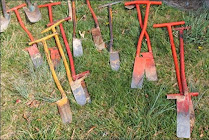Stream bank erosion is one of the larger sources of non-point source pollution in the watershed. Unstable banks contribute sizeable amounts of sediment into streams smothering macroinvertebrates and fish that live on the bottom of streams.
The SRWC has successfully developed several stream bank restoration projects that uses a combination of bioengineering techniques.
Funding opportunities are available that can cover the cost of stabilizing the banks at no cost to the landowner.
If you own a property along a creek and have severe erosion occurring, please contact Shaun Busler at (724) 776-0161.
Spring Is The Time For Planting
As the days get longer and start to warm, you know it’s close to planting time. Usually around the end of March or early April, bareroot trees and shrubs are available at many local nurseries and online.
Some species require you to order them months in advance due to their popularity. Bareroot plants are any tree or shrub that are dug up from the ground while dormant and have their soil or growing medium removed from around the roots.
These plants are grown in large quantities and are easier to produce than other types of plants allowing them to be sold for less. Native, ornamental, and edible varieties of plants can be bought as bareroot.
The SRWC typically buys bareroot trees and shrubs for our stream bank restoration projects.
One of our favorite places to order plants is from Pikes Peak Nursery in Indiana County. They have some of the best prices around but you typically have to order more than 50 at a time!
Care must be taken not to let the roots dry out or the plant will die. The roots can be dipped in a gel polymer substance that absorb hundreds of times their weight in water, which help the plants from drying out.
It helps to reduce transplant shock and decreases the frequency needed for watering. Smaller bareroot plants are usually planted with a dibble bar, a tool specifically made to quickly plant bareroot seedlings.
With practice, you can plant over 500 seedlings per day!
Potted and ball and burlap plants are also excellent choices, but you may pay a little extra. Many big box retailers, including Lowes, Home Depot, and even Walmart, carry these types of plants.
These plants also are more flexible as far as timing. They can be even planted in the summer with enough watering.
Spring plantings typically require less watering since nature takes care it for you. More herbaceous plants are available as potted than bareroot due to their delicate root structure.
Reeds Run Restoration Area Trash Cleanup - By: Ben Busler
The Aultman Watershed Association for Restoring the Environment (AWARE) has been cleaning up the Aultmans Run Watershed located in Indiana County for over 20 years.
From their first efforts at dump cleanups to the construction of three abandoned mine discharges, their work has drastically improved the quality of the streams in the watershed.
Their work has included the SR286 Passive Treatment System, the Neal Run Restoration Area, and the Reeds Run Restoration Project.
AWARE also has two new AMD/AML projects are on the horizon, the Neal Run Restoration and Rail Trail Development and the Coon Hollow Restoration.
On Saturday March 19th it started off a little bit rainy but it didn’t stop seventeen people from coming to the trash cleanup at the Reeds Run Restoration Area.
Equipped with gloves and bags, eighteen volunteers, from age 13 to adult, including six students from Indiana University of Pennsylvania, collected trash for six hours. Even though it started off a little rainy it ended up being a nice day.
Trash has likely been accumulating at this old mine site for the last 40 years. Trash was also picked up along a half-mile section of Locust Road.
An estimated 5,000 pounds of trash and 250 tires were collected, which filled up an entire roll off dumpster!
Rosebud Mining Company, a local coal company producing metallurgical coal for steel companies around the world, donated the dumpster for the cleanup effort.
Some interesting things we found were: an old light from the underground mine, an old camera and radio, a flat screen television, a large pool liner, many old car parts, and motor oil bottles.
Glass bottles were the most numerous items that volunteers had to bag up. Unfortunately, there is still a lot more than needs to be done.
KIDS Catalyst
And don't miss the KIDS Catalyst word game - science jokes.
Click Here to read the entire Catalyst newsletter. Click Here to sign up for your own copy.
For more information on programs, projects, upcoming events and how you can get involved, visit the Slippery Rock Watershed Coalition website. Follow them on Facebook. Click Here to sign up to sign up for regular updates.
[Posted: March 31, 2022] PA Environment Digest

No comments:
Post a Comment